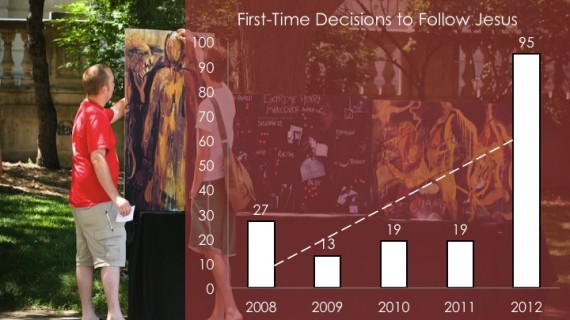
Photo Courtesy of Slack pics (creative commons)
By Linson Daniel
I was contemplating the impact of missionaries coming to India and sharing the Gospel with my ancestors. If it were not for their efforts, then I do not think I would be a Christian today. I am amazed at how God changed generations of countless families in India, including mine, because of the faithfulness of those few missionaries.
Consequently, evangelism is very important to me. I believe that evangelism should be the leading value for any church, para-church, and/or ministry. Out of a healthy culture of evangelism flow the values of growth, discipleship, community, worship, etc.
One of the first things I did as Area Director for North Texas and Oklahoma was to instill the importance of evangelism within my team. My area did not have a fruitful history in the area of evangelism, and this eventually created stagnation in all of the other values. Therefore, I initiated an evangelistic culture shift.
Here are the 5 steps that I used to lead an evangelistic culture shift within our team:
1. Gain clarity on the current evangelistic culture.
The first thing I did was gather data. I wanted to know how many students were being trained, resourced, and sent out on mission on campus. Also, I wanted to know how many people made significant decisions to become Jesus followers at these campuses. The data revealed that our progress was mediocre at best. I shared these brutal facts with my team.
It is important for you to gain clarity on your current situation. However, you must not remain focused on your mediocre reality or it will create cynicism. You must shift the focus toward an attractive future. This is what is known as the “Stockdale Paradox” in Jim Collins’ book Good to Great. Gain clarity but keep hope alive for the future.
2. Create discontent about the evangelistic progress.
Talking about an attractive future was not enough; I needed to create discontent with this current culture. Our mindset had to change! One exercise we did to create discontent was to dream big with “what if” statements.
What if my campus had a spiritual awakening?
What if each team member gave an evangelistic call to action twice a semester?
What if we asked people to consider following Jesus during the first 3 weeks of being on campus?
What if our area had the MOST significant decisions to follow Jesus in the whole region?
The atmosphere changed as optimism and hoped filled our hearts.
The second exercise we did to create discontent was to begin praying for these “what if” statements to become reality. We prayed passionately and frequently. Missional prayer is an exercise that remains in our team meetings to this very day. Dreaming and praying are excellent ways to create discontent in the current reality and desire an attractive future.
3. Embody a new evangelistic mindset.
This is a simple idea. Leaders go first. If the culture needs to change, then you must embody that change. You do not replicate in others what you merely say, but you replicate who you are. I had to go for it and be willing to fall flat on my face. I had to show that failure is not bad, but it can be progress.
What did I do? I accepted 3 evangelistic speaking engagements that very semester in my area. Man, I was so scared. I started playing the “what if” game in reverse! What if I hear crickets when I invite students to follow Jesus? Worse yet – what if people laughed? Yikes!
God had other plans. After those three meetings, our area experienced 32 new decisions to follow Jesus! These numbers already crushed our data from prior years, and we were just getting started. I took the risk to go first, and it created social proof that our team can shift culture. Embodying the new mindset makes casting vision more effective, genuine, and believable. Have faith, and go first.
4. Ask others to imitate your evangelistic mindset.
I boldly asked others on the team to go for it, just like I did. I brainstormed with them. I worked alongside them. I helped them troubleshoot. Eventually, my team needed me less and less. I used the art of delegation and situational leadership to help each staff member become effective evangelists.
They imitated me at first, but later they embodied the new mindset also. This led to massive culture shift. We were acting and talking very differently. Check out the graph below:

As the culture shifted, you can see how the results were drastically different! Ask others to imitate what you did, help them when they do, and believe it will catch on everywhere.
5. Celebrate each and every evangelistic action.
Anytime I heard something evangelistic happened on one my campuses, I would highlight it. I bragged about my team members everywhere I went – at regional meetings, speaking engagements, training events, etc. I wanted my team to be affirmed and celebrated for being evangelistic.
You need to celebrate! You need a culture of stories – both of victory and defeat. Telling stories is a great way to debrief and interpret the experience. These experiences will lead to deeper truths. These truths will shape and renew your team’s culture. Celebrate together as you go on mission together!
Repeat these 5 steps and you will gain more traction. Eventually, evangelism will be normative. The temptation will be to blame your team for not “getting it”, but do not succumb to that narrative. Stay committed to your team, walk with them, serve them, and celebrate with them.
Matthew 9:35-38 states, “The harvest is plentiful but the workers are few. Ask the Lord of the harvest, therefore, to send out workers into his harvest field.” Notice that we cannot control the harvest or the outcome, but we can fill the pipeline with more laborers. Evangelism is a discipline that should be a part of all of our lives. Let us change generations together. Let’s go!
What are other ways to shift the culture to become more evangelistic? I’d love to hear what you want to add to this list. Please comment below.


I like those five steps, Linson. It seems to me that step five is important and valuable in everything we do. Affirming others and celebrating what they have achieved are dramatic and effective spurs for them to do even better and also encourage others to begin to follow the same path.
But it’s not something I’ve seen suggested before in connection with evangelism. Glad you raised it. It am sure it can make a difference.
Chris, thanks for your input! Affirmation and celebration are powerful motivators.
LINSON DANIEL… ever since hearing you talk at USSLT at Urbana about how one of your chapters did a proxe every other week on semester… We trying more accpeting failure… even Bollywood and banana chips!! And our chapter is being more invitational to say, “Do you want to follow Jesus?” and people are saying yes!!! So I think to be more evangelistic is simply/blatantly asking if they want to follow Christ! You hit me hardest at Urbana in a real way for application #measurable
Jessie, I am thrilled to hear about your evangelistic efforts and fruit on campus! Way to go! I pray that God continues to open doors on your campus. Haha, Bollywood and banana chips!!
Great read! Keep them coming!